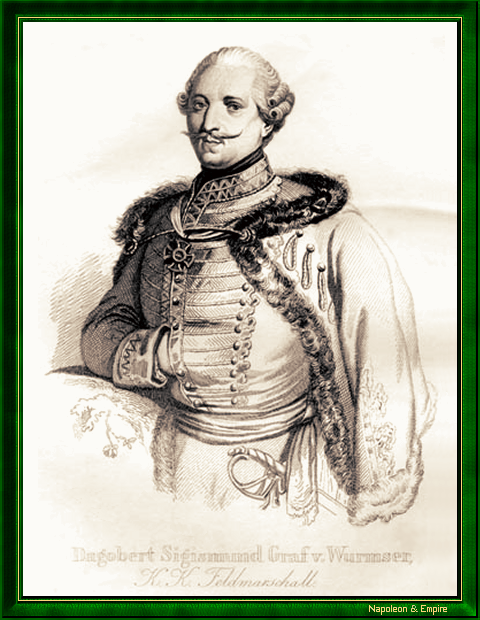Dagobert Sigismund von Wurmser
Count of Vendenheim and Sundhausen
Pronunciation:

Dagobert Sigismund von Wurmser, Count of Vendenheim and Sundhausen, was born in Strasbourg on May 7, 1724, into an old and wealthy Alsatian family: the Wurmsers had been lords of Vendenheim, a village north of Strasbourg, since 1456.
He entered French service at a very early age, and in 1742 took up arms as an officer against Austrian partisans in Bohemia. During the Seven Years' War, he fought for Louis XV at the head of his Corps Franc.
In 1762, he followed his father into the service of the Holy Roman Empire and became chamberlain to Maria Theresa.
Wurmser distinguished himself during the Austro-Prussian conflict of 1778-1779, and when the conflict with the French Republic broke out, he commanded the army of the Upper Rhine under the Duke of Brunswick.
In July 1793, he confronted the French troops seeking to clear Mainz, driving them back towards Haguenau and taking Fort-Louis, but having to withdraw before Jean-Charles Pichegru due to lack of support from Charles-Guillaume-Ferdinand de Brunswick-Wolfenbüttel; this temporarily cost him his command.
In 1795, back at the head of his army, he defeated Pichegru at Handschuhsheim, near Heidelberg, then obtained the surrender of the town of Mannheim defended by General Anne Charles Basset de Montaigu; among the prisoners was the young brigadier general Louis-Nicolas Davout (future marshal of the empire and prince of Eckmühl), whom he authorized to retire, on parole, to his home.
At the age of 71, Dagobert Sigmund von Wurmser was at the height of his military glory, having been appointed Marshal following the victory at Mannheim. In May 1796, Emperor Francis II of the Holy Roman Empire called upon him to replace Johann von Beaulieu, who had just been defeated by the young general Napoleon Bonaparte in Italy.
He immediately went on the offensive against Bonaparte, whom he described as a "young man", defeating the French on July 29 at Montebaldo, and on July 30 at Calmasino, opening the road to Mantua. But unable to join forces with Peter Vitus von Quasdanovitch, defeated at Lonato, he was defeated by Napoleon Bonaparte at Castiglione on August 5, 1796, and retreated.
A few months later, trapped in Mantua , he defended the city during a long siege, but had to surrender on February 2, 1797; Napoleon Bonaparte, recognizing the old marshal's courage, paid him military honors on this occasion.
On his return to Vienna, Francis II gave him command of Hungary, but Wurmser died a few weeks later, on April 21, 1797, in the imperial capital.
"Count Dagobert Sigismund von Wurmser". Print of the nineteenth century.

At the end of his career, Dagobert de Wurmser still impressed with his courage, but had become so deaf that he couldn't hear the bullets whistling around him.